道家儒家佛家哲学【英文精品】
- 格式:ppt
- 大小:357.50 KB
- 文档页数:25
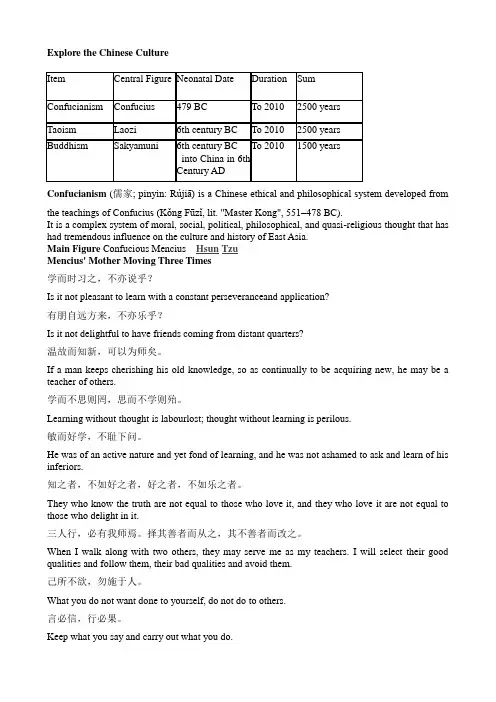
Explore the Chinese CultureConfucianism (儒家; pinyin: Rújiā) is a Chinese ethical and philosophical system developed from the teachings of Confucius (Kǒng Fūzǐ, lit. "Master Kong", 551–478 BC).It is a complex system of moral, social, political, philosophical, and quasi-religious thought that has had tremendous influence on the culture and history of East Asia.Main Figure Confucious Mencius Hsun TzuMencius' Mother Moving Three Times学而时习之,不亦说乎?Is it not pleasant to learn with a constant perseveranceand application?有朋自远方来,不亦乐乎?Is it not delightful to have friends coming from distant quarters?温故而知新,可以为师矣。
If a man keeps cherishing his old knowledge, so as continually to be acquiring new, he may be a teacher of others.学而不思则罔,思而不学则殆。
Learning without thought is labourlost; thought without learning is perilous.敏而好学,不耻下问。
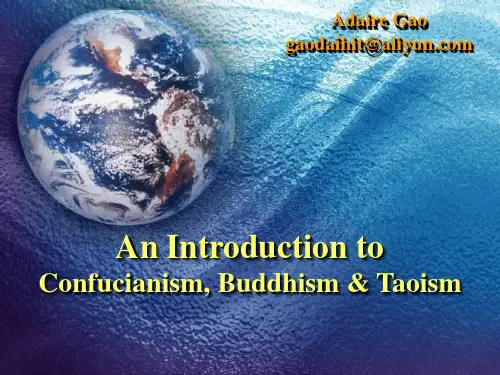
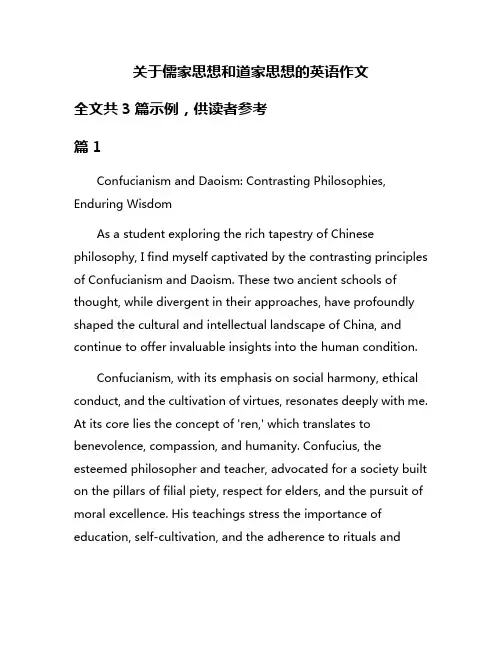
关于儒家思想和道家思想的英语作文全文共3篇示例,供读者参考篇1Confucianism and Daoism: Contrasting Philosophies, Enduring WisdomAs a student exploring the rich tapestry of Chinese philosophy, I find myself captivated by the contrasting principles of Confucianism and Daoism. These two ancient schools of thought, while divergent in their approaches, have profoundly shaped the cultural and intellectual landscape of China, and continue to offer invaluable insights into the human condition.Confucianism, with its emphasis on social harmony, ethical conduct, and the cultivation of virtues, resonates deeply with me. At its core lies the concept of 'ren,' which translates to benevolence, compassion, and humanity. Confucius, the esteemed philosopher and teacher, advocated for a society built on the pillars of filial piety, respect for elders, and the pursuit of moral excellence. His teachings stress the importance of education, self-cultivation, and the adherence to rituals andpropriety as a means of maintaining social order and promoting personal growth.One of the most profound aspects of Confucianism, in my opinion, is its emphasis on the rectification of names – the idea that language and terminology should accurately reflect the true nature of things. This principle underscores the importance of clarity, precision, and integrity in our interactions with others and in our understanding of the world around us. As a student, I find this concept particularly relevant, as it encourages me to strive for intellectual honesty and to challenge superficial or misleading definitions.In contrast, Daoism, with its focus on the natural order, spontaneity, and the harmonious coexistence of opposites, offers a refreshingly different perspective. The Dao, often translated as 'the Way,' represents the ineffable and eternal principle that underlies all existence. Lao Tzu, the legendary author of the Dao De Jing, advocated for a life of simplicity, humility, and non-action (wu wei) – a concept that encourages us to align ourselves with the natural flow of the universe, rather than forcefully imposing our will upon it.Daoism's emphasis on embracing change, letting go of attachments, and cultivating inner tranquility resonates deeplywith me as a student navigating the complexities and uncertainties of life. In a world that often demands constant productivity and achievement, the Daoist principles of effortless action and acceptance of the present moment offer a refreshing counterbalance, reminding me to find joy and fulfillment in the journey itself, rather than solely fixating on the destination.While Confucianism and Daoism may appear to be diametrically opposed in their perspectives, I find that both philosophies offer complementary insights that can enrich our understanding of the human experience. Confucianism's emphasis on moral cultivation, social responsibility, and the pursuit of knowledge aligns with my desire to contribute positively to society and to continually strive forself-improvement. At the same time, Daoism's teachings on embracing the natural order, letting go of attachments, and cultivating inner peace provide a much-needed counterbalance to the often-hectic pace of modern life, reminding me to find balance and harmony amidst the chaos.As I delve deeper into these ancient wisdom traditions, I am struck by their enduring relevance and their ability to shed light on the complexities of the human experience. Confucianism's emphasis on ethics, education, and societal harmony offers aframework for navigating the intricate web of interpersonal relationships and fostering a more just and harmonious society. Simultaneously, Daoism's teachings on the inherent unity of all things, the acceptance of change, and the cultivation of inner peace provide a counterweight to the pursuit of external validation, reminding us to find contentment and fulfillment within ourselves.In my journey as a student, I find myself drawn to the complementary insights offered by these contrasting philosophies. Confucianism's emphasis on moral cultivation and social responsibility inspires me to strive for personal growth and to contribute positively to the world around me. At the same time, Daoism's teachings on embracing the natural order and cultivating inner tranquility remind me to find balance, to let go of attachments, and to appreciate the present moment in all its richness.As I continue to explore the depths of these ancient wisdom traditions, I am filled with a sense of gratitude for the enduring legacy of Confucianism and Daoism. These philosophies have withstood the test of time, offering timeless insights and inspiring generations of thinkers, scholars, and seekers of wisdom. In a world that often seems chaotic and unpredictable,these teachings provide a compass, guiding us towards a deeper understanding of ourselves, our place in the world, and the interconnectedness of all things.篇2Confucianism and Daoism: Divergent Philosophies, Lasting InfluenceAs I delved into the ancient philosophies of China, two schools of thought particularly captivated me: Confucianism and Daoism. While both emerged around the 6th century BCE during a period of profound sociopolitical upheaval, they present sharply contrasting worldviews and approaches to life. Yet, their enduring relevance and impact on Chinese culture and philosophy cannot be overstated.Confucianism, founded by the sage Confucius, is a philosophy rooted in ethics, morality, and social harmony. At its core lies the concept of "ren," often translated as benevolence or humaneness. Confucius believed that by cultivating virtues such as filial piety, loyalty, and propriety, individuals could create a well-ordered and stable society. The emphasis on hierarchical relationships, respect for elders and ancestors, and the importance of education and self-cultivation set Confucianismapart as a philosophy deeply concerned with social cohesion and moral rectitude.In contrast, Daoism, originating from the teachings of Laozi and Zhuangzi, embraces a more naturalistic and mystical worldview. The central tenet of Daoism is the "Dao," an ineffable and ever-flowing force that underlies all existence. Daoists advocate living in harmony with the Dao, embracing simplicity, spontaneity, and non-action (wu wei). Unlike Confucianism's emphasis on social order and moral cultivation, Daoism encourages transcending societal norms and embracing a more intuitive, natural way of being.One of the most striking differences between these philosophies lies in their perspectives on human nature and society. Confucianism holds a optimistic view of human nature, believing that individuals possess an innate capacity for goodness and moral development. Through education,self-reflection, and adherence to virtuous principles, one can attain moral perfection and contribute to a harmonious society. Conversely, Daoism adopts a more skeptical stance, viewing human interference and societal constructs as artificial constraints that distort the natural order of things.Daoists advocate a return to simplicity and a rejection of societal conventions, prioritizing a spontaneous and effortless alignment with the Dao. This emphasis on "naturalness" contrasts sharply with Confucianism's emphasis on cultivating moral virtues and adhering to social norms and hierarchies.Despite their divergent philosophical foundations, both Confucianism and Daoism have profoundly shaped Chinese culture and thought. Confucianism, with its emphasis on social harmony, filial piety, and education, has deeply influenced Chinese ethical and political systems for centuries. Its impact can be seen in the reverence for ancestral customs, the importance placed on family ties, and the deep respect for scholars and teachers.Daoism, on the other hand, has influenced Chinese art, literature, and spirituality. The concept of "wu wei" (effortless action) and the pursuit of harmony with nature have inspired countless works of poetry, painting, and calligraphy. Daoist principles of simplicity, spontaneity, and detachment have also influenced various spiritual practices, such as Tai Chi and meditation.As a student of philosophy, I find myself drawn to both Confucianism and Daoism, not only for their historicalsignificance but also for their timeless wisdom and insights. While Confucianism offers a blueprint for creating a harmonious and virtuous society, Daoism reminds us of the beauty and power of embracing the natural flow of life.In a world increasingly shaped by modernity, technology, and ever-changing societal norms, these ancient philosophies offer valuable perspectives on navigating the complexities of human existence. Confucianism's emphasis on moral cultivation, respect for tradition, and social responsibility resonates with those seeking a sense of ethical grounding and community. Simultaneously, Daoism's call to embrace simplicity, spontaneity, and harmony with nature provides a counterbalance to the frenetic pace of modern life, inviting us to pause, reflect, and connect with the essence of our being.Perhaps the greatest lesson we can glean from these philosophies is the importance of balance and synthesis. Just as the yin and yang symbolize the complementary forces of the universe, Confucianism and Daoism offer contrasting yet interconnected perspectives on the human experience. By embracing the virtues of social responsibility and moral cultivation while also cultivating a sense of inner peace,spontaneity, and oneness with nature, we can strive for a more holistic and harmonious way of being.As I continue my philosophical journey, I am reminded of the enduring wisdom and relevance of these ancient Chinese traditions. In a world often characterized by conflict, disconnection, and a relentless pursuit of progress, the timeless teachings of Confucianism and Daoism offer invaluable guidance on navigating the complexities of human existence with grace, virtue, and a deep reverence for the natural order of things.篇3Confucian and Daoist Philosophies: Contrasting Ideologies That Shaped Ancient Chinese SocietyAs an avid student of philosophy, I have always been fascinated by the profound impact that ancient Chinese philosophies have had on shaping the cultural fabric of the nation. Among the myriad of schools of thought that emerged during the turbulent Warring States period, two philosophical traditions stand out as the most influential: Confucianism and Daoism. These contrasting ideologies, while distinct in their approaches, have profoundly shaped the sociopolitical and ethical landscape of China for centuries.Confucianism, founded by the revered scholar Confucius, is a philosophy that emphasizes the importance of social harmony, ethical conduct, and the cultivation of virtues such as filial piety, righteousness, and propriety. At its core, Confucianism advocates for a hierarchical society governed by a meritocratic system, where individuals are expected to fulfill their respective roles and responsibilities within the social order. The concept of "ren," which translates to benevolence or humanity, is a central tenet of Confucian thought, encouraging individuals to treat others with kindness, respect, and compassion.One of the most striking aspects of Confucianism is its emphasis on education and self-cultivation. Confucius believed that through diligent study and personal growth, individuals could attain moral excellence and become exemplary leaders and citizens. This emphasis on learning and self-improvement has had a profound impact on Chinese culture, where education has long been revered as a means to personal and societal advancement.In contrast to the structured and hierarchical nature of Confucianism, Daoism, founded by the legendary philosopher Laozi, embraces a more naturalistic and spontaneous approach to life. The central concept of Daoism is the "Dao," which can beloosely translated as "the Way" or the fundamental principle that underlies the natural order of the universe. Daoists believe in living in harmony with the Dao, embracing simplicity, spontaneity, and the natural flow of existence.Daoism advocates for a minimalistic lifestyle, free from the constraints of societal norms and expectations. It encourages individuals to cultivate inner peace and tranquility, embracing the natural rhythms of life and letting go of excessive desires and attachments. The concept of "wu wei," or effortless action, is a central tenet of Daoist thought, encouraging individuals to act in alignment with the natural order rather than forcing outcomes through excessive effort.While Confucianism and Daoism may seem diametrically opposed in their approaches, they share a common goal of promoting a harmonious and virtuous society. Confucianism, with its emphasis on social order and ethical conduct, provided a framework for governance and societal stability, while Daoism offered a complementary perspective on living in harmony with nature and embracing simplicity.Throughout Chinese history, these two philosophies have influenced various aspects of society, from politics and governance to art, literature, and personal conduct. Confucianideals have shaped the Chinese education system, civil service examinations, and the hierarchical structure of government, while Daoist principles have influenced Chinese traditional medicine, martial arts, and the appreciation of nature.As a student fascinated by these ancient philosophies, I cannot help but marvel at their enduring relevance and influence. In a world that often feels chaotic and overwhelming, the teachings of Confucianism and Daoism offer timeless wisdom and guidance on how to live a virtuous and harmonious life.Confucianism's emphasis on ethical conduct, filial piety, and social responsibility resonates deeply with me, as I believe that cultivating these virtues is crucial for building a just and compassionate society. At the same time, Daoism's teachings on embracing simplicity, living in harmony with nature, and letting go of excessive desires strike a chord within me, reminding me to find balance and inner peace amidst the complexities of modern life.As I continue my academic journey, delving deeper into the intricacies of these ancient philosophies, I am reminded of the profound wisdom they offer. In a rapidly changing world, where traditional values and modern ideals often clash, the teachings of Confucianism and Daoism provide a timeless foundation fornavigating life's complexities with grace, wisdom, and a deep appreciation for the natural order of the universe.Through their contrasting yet complementary perspectives, these ancient philosophies have left an indelible mark on Chinese culture and continue to inspire individuals across the globe to seek harmony, virtue, and a deeper understanding of the human experience. As a student, I am humbled by the breadth and depth of these philosophical traditions and am inspired to continue exploring their teachings, in the hopes of gaining a more profound understanding of the world and my place within it.。
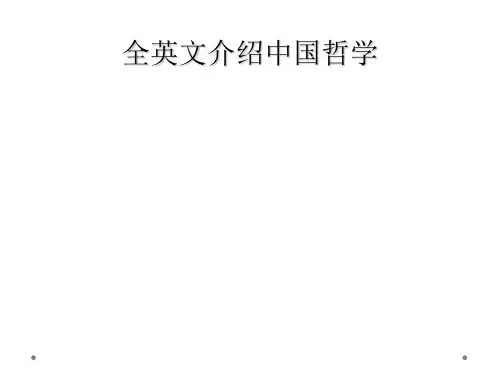

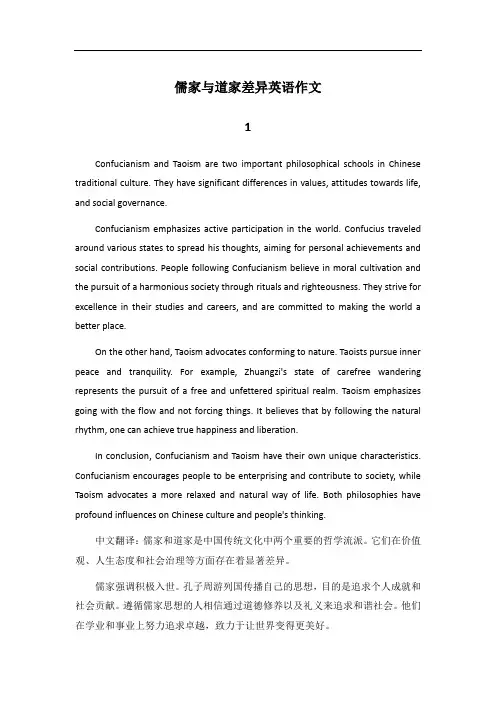
儒家与道家差异英语作文1Confucianism and Taoism are two important philosophical schools in Chinese traditional culture. They have significant differences in values, attitudes towards life, and social governance.Confucianism emphasizes active participation in the world. Confucius traveled around various states to spread his thoughts, aiming for personal achievements and social contributions. People following Confucianism believe in moral cultivation and the pursuit of a harmonious society through rituals and righteousness. They strive for excellence in their studies and careers, and are committed to making the world a better place.On the other hand, Taoism advocates conforming to nature. Taoists pursue inner peace and tranquility. For example, Zhuangzi's state of carefree wandering represents the pursuit of a free and unfettered spiritual realm. Taoism emphasizes going with the flow and not forcing things. It believes that by following the natural rhythm, one can achieve true happiness and liberation.In conclusion, Confucianism and Taoism have their own unique characteristics. Confucianism encourages people to be enterprising and contribute to society, while Taoism advocates a more relaxed and natural way of life. Both philosophies have profound influences on Chinese culture and people's thinking.中文翻译:儒家和道家是中国传统文化中两个重要的哲学流派。
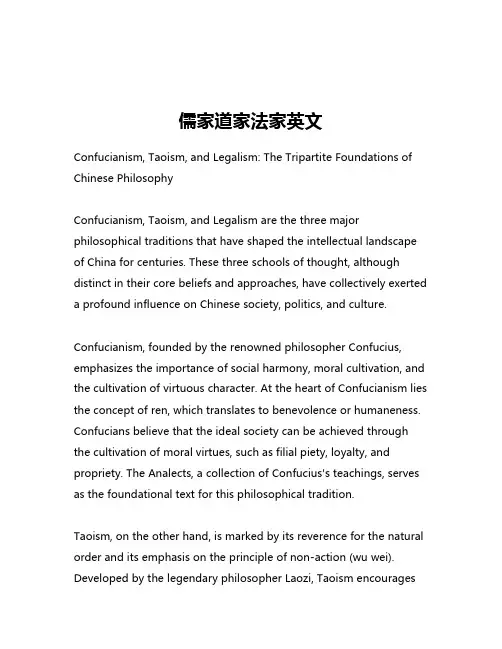
儒家道家法家英文Confucianism, Taoism, and Legalism: The Tripartite Foundations of Chinese PhilosophyConfucianism, Taoism, and Legalism are the three major philosophical traditions that have shaped the intellectual landscape of China for centuries. These three schools of thought, although distinct in their core beliefs and approaches, have collectively exerted a profound influence on Chinese society, politics, and culture.Confucianism, founded by the renowned philosopher Confucius, emphasizes the importance of social harmony, moral cultivation, and the cultivation of virtuous character. At the heart of Confucianism lies the concept of ren, which translates to benevolence or humaneness. Confucians believe that the ideal society can be achieved through the cultivation of moral virtues, such as filial piety, loyalty, and propriety. The Analects, a collection of Confucius's teachings, serves as the foundational text for this philosophical tradition.Taoism, on the other hand, is marked by its reverence for the natural order and its emphasis on the principle of non-action (wu wei). Developed by the legendary philosopher Laozi, Taoism encouragesindividuals to embrace the inherent harmony of the universe and to live in accordance with the Tao, the ultimate source of all existence. The Tao Te Ching, attributed to Laozi, is the seminal text of Taoism and outlines the fundamental principles of this philosophical tradition.In contrast to the humanistic and naturalistic approaches of Confucianism and Taoism, Legalism emerged as a pragmatic and authoritarian philosophy that focused on the establishment of a strong and efficient state. Advocated by thinkers such as Shang Yang, Li Si, and Han Feizi, Legalism emphasizes the importance of strict laws, rigid bureaucratic structures, and the centralization of power to achieve political and social stability. The Legalists believed that the ultimate goal of the state was to maintain order and maximize the power of the ruling class.Despite their differences, these three philosophical traditions share a common heritage and have profoundly shaped the course of Chinese history. Confucianism, with its emphasis on social harmony and moral cultivation, has largely influenced the development of Chinese culture and values, particularly in the realm of education and interpersonal relationships. Taoism, with its emphasis on the natural order and the principle of non-action, has contributed to Chinese art, literature, and the appreciation of the natural world. Legalism, on the other hand, has had a significant impact on the development ofChinese statecraft and the organization of political institutions.The interplay and synthesis of these three philosophical traditions have often been the subject of scholarly debates and discussions. While each school of thought has its distinct characteristics and approaches, they have also been known to borrow and incorporate ideas from one another, leading to the emergence of various syncretic movements and interpretations.In the modern era, the influence of Confucianism, Taoism, and Legalism continues to be felt, both in China and throughout the broader Asian region. These philosophical frameworks have been reinterpreted and adapted to address contemporary challenges, and their relevance remains a subject of ongoing discourse and exploration.In conclusion, Confucianism, Taoism, and Legalism represent the three foundational pillars of Chinese philosophy, each contributing to the rich tapestry of Chinese intellectual and cultural heritage. Understanding the nuances and interrelationships of these philosophical traditions is crucial for a deeper appreciation of China's past, present, and future.。
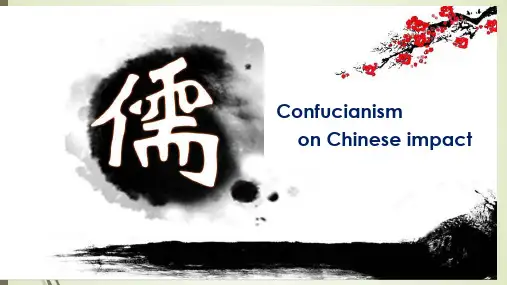
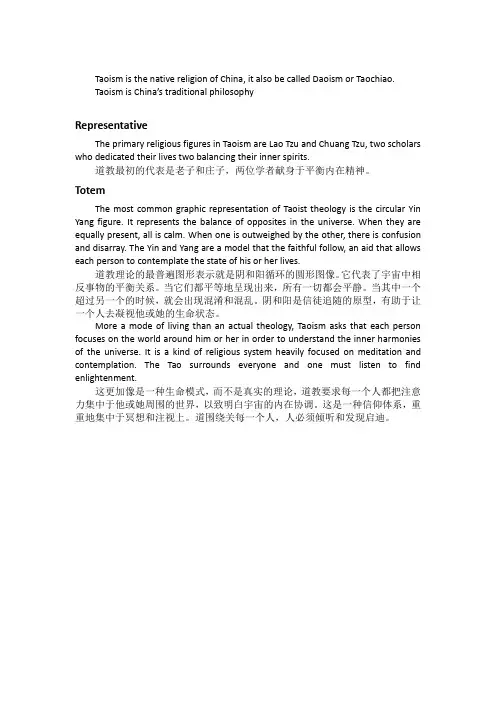
Taoism is the native religion of China, it also be called Daoism or Taochiao.Taoism is China’s traditional philosophyRepresentativeThe primary religious figures in Taoism are Lao Tzu and Chuang Tzu, two scholars who dedicated their lives two balancing their inner spirits.道教最初的代表是老子和庄子,两位学者献身于平衡内在精神。
TotemThe most common graphic representation of Taoist theology is the circular Yin Yang figure. It represents the balance of opposites in the universe. When they are equally present, all is calm. When one is outweighed by the other, there is confusion and disarray. The Yin and Yang are a model that the faithful follow, an aid that allows each person to contemplate the state of his or her lives.道教理论的最普遍图形表示就是阴和阳循环的圆形图像。
它代表了宇宙中相反事物的平衡关系。
当它们都平等地呈现出来,所有一切都会平静。
当其中一个超过另一个的时候,就会出现混淆和混乱。
阴和阳是信徒追随的原型,有助于让一个人去凝视他或她的生命状态。
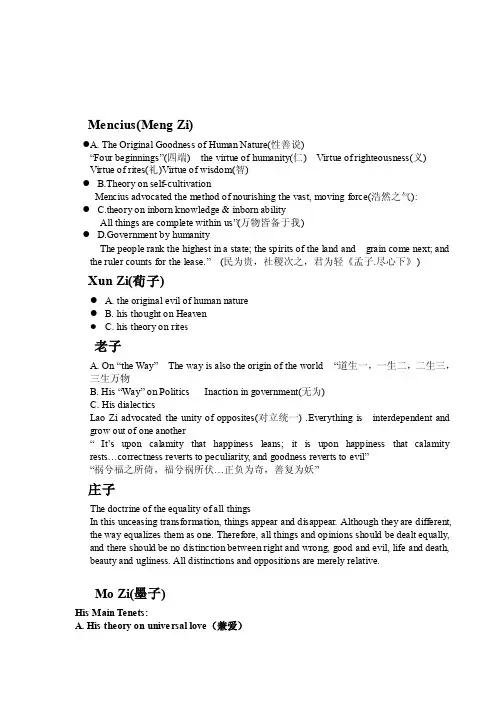
Mencius(Meng Zi)●A. The Original Goodness of Human Nature(性善说)“Four beginnings”(四端) the virtue of humanity(仁) Virtue of righteousness(义)Virtue of rites(礼)Virtue of wisdom(智)● B.Theory on self-cultivationMencius advocated the method of nourishing the vast, moving force(浩然之气):● C.theory on inborn knowledge & inborn abilityAll things are complete within us”(万物皆备于我)● ernment by humanityThe people rank the highest in a state; the spirits of the land and grain come next; and the ruler counts for the lease.”(民为贵,社稷次之,君为轻《孟子.尽心下》)Xun Zi(荀子)● A. the original evil of human nature● B. his thought on Heaven● C. his theory on rite s老子A. On “the Way”The way is also the origin of the world “道生一,一生二,二生三,三生万物B. His “Way” on Politics Inaction in government(无为)C. His dialecticsLao Zi advocated the unity of opposites(对立统一) .Everything is interdependent and grow out of one another“ It’s upon calamity that happiness leans; it is upon happiness that calamity rests…correctness reverts to peculiarity, and goodness reverts to evil”“祸兮福之所倚,福兮祸所伏…正负为奇,善复为妖”庄子The doctrine of the equality of all thingsIn this unceasing transformation, things appear and disappear. Although they are different, the way equalizes them as one. Therefore, all things and opinions should be dealt equally, and there should be no distinction between right and wrong, good and evil, life and death, beauty and ugliness. All distinctions and oppositions are merely relative.Mo Zi(墨子)His Main Tenets:A. His theory on universal love(兼爱)Universal love means love all people equally regardless of their nationality, social status, or relationships.B. Mo Zi also advocated frugality and opposed all forms of extravagance.(节用)C.Mo Zi attached music and musical festivals(非乐).D. Mo Zi also advocated simplicity of funerals.(节葬)E. the will of Heaven(天志): must be obeyed and accepted as the universal standard of human thought and action.F. the existence of the SpiritsHis theory on governmentG. Exaltation of the worthy(尚贤):in regard to government Mo Zi favored virtue and talent as the basis for public leadership and appointment.H. Identification with the superior(尚同)to Mo Zi , the emperor is not only a ruler, but becomes the final arbiter of all teaching.发政于天下之百姓,言曰:闻善而不善,皆以告其上;上之所是,必皆是之;上之所非,必皆非之。
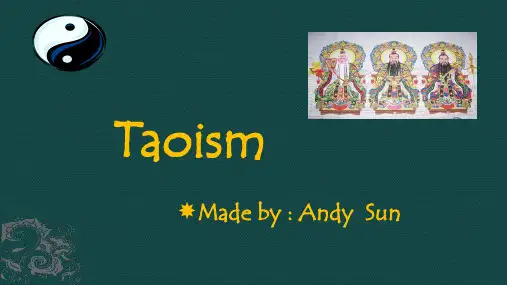
The Differences and Similarities between Daoism and Buddhism1.IntroductionIt is well-known that Buddhism was originally a foreign religion and culture to Chinese people. Since its entry in China, it has been constantly localized. However, Buddhism still keeps its core doctrines as Indian Buddhism. Daoism is a typical native culture in China, or can be regarded as a local region. Contents of both Daoism and Buddhism are very complex. Compared with Buddhism, Daoism failed to develop a complete theoretical system. As a religion, Daoism has strong folk feature and contains many superstitious ideas. It came from the philosophy of Lao Tse and Chuang-Tzu, but meanwhile has essential difference and contradictions, so there are still a lot of conflicts within the Daoism School. Although Daoism is not as mature and complete as Buddhism, these two religions and cultures have several similarities and differences. This paper will critically analyze the similarities and differences between Daoism and Buddhism, so as to get a better understanding of the two important religions and cultures.2.Similarities between Daoism and BuddhismIn Chinese history, Daoism and Buddhism had once had severe sectarian bias. The two religions had a lot of conflicts and even maligned each other. However, it is obvious that the real masters of the two religions in history could always give up sectarian bias, advocated equality and learned from each other humbly. As a result, in many Daoist and Buddhist works, the authors often mentioned “Sakyamuni said” or “Dao replied”. They present ideas of the two religions equally and even integratedthem to explain the same phenomenon or principle. In fact, Daoism and Buddhism really have something in common. The largest similarity is both the two religions regard mental calmness as a life pursuit, all preaches and practices just aim to make people reach calm. Specifically, both Daoism and Buddhism propose that people should not be restrained or enslaved by their body instinct and require people to control their sensual desires, so as to go back to natural calmness of heart and soul.In terms of health maintenance, the two religions have a lot of similar ideas. First of all, both of them have inherited and developed the concept of preventive treatment of disease from the Inner Canon of Huangdi, and proposed the idea of nature-cultivation. They emphasize on that those who do well in nature-cultivation can realize preventive treatment of disease. Secondly, both of them advocate spiritual maintenance, namely people should keep calm when suffering from physical disease, so as to recover as soon as possible. Thirdly, both of them encourage people to use dietetic invigoration. For example, they recommend elder people to eat warm, soft and cooked food and avoid having rough, hard and cold food. Besides, they also propose that effect of food to some degree is better than medicine. Fourthly, both of them attach great importance to care in daily life. For instance, they propose that every aspect of people’s daily life should have specific mechanism, so as to keep life balanced. Fifthly, both of them pay certain attention to the support of medicine. Except for dietetic invigoration, people should also properly use medicine to maintain health. Last but not the least, both Daoism and Buddhism suggest people to preserve health according to different seasons.3. Differences between Daoism and BuddhismFirst of all, in terms of the view of life and death, Buddhism admires “going beyond the world”, while Daoism advocates “retreat”. According Buddhist idea, reality is just like a “bitter sea” for people. People feel powerless in face of the reality, so they have to endure everything and detach themselves from the world. In order to effective endure and detach, they must give up all kinds of desires and pursue the bitter sea which creates the eternal cycle of birth and death, and finally get into Nirvana, a pure land without bitterness or sorrow. In a word, Buddhism advocates people to abandon pursuit for realistic material and attach great importance to spiritual cultivation and the yearning for next life. Unlike Buddhism, Daoism believes that improvement of personal cultivation even becoming an immortal just depends on hard work of individuals and has nothing to do with others. Therefore, people are encouraged to leave the crowd and move to a remote place to make pills of immortality and cultivate vital energy. The cultivating way of Daoism also fully reflects the “retreat”idea of this religion. Daoist followers use Qigong and special pills to cultivate themselves from both internal and external perspective. While doing Qigong and having pills are private matters which need to be far from society. As a result, Daoism stands for “retreat”.Secondly, Buddhism more highlights mental state, but Daoism more emphasizes on the importance of physical condition. Daoism regards life as reality, pursues longevity and becoming immortal with human body. According to Daoist idea, people’s life isconsisted of vigor (Qi), human body is the house for spirit. If people want to be alive as long as possible, they must cultivate their physical body and spirit at the same time, namely getting refined both internally and externally. On the contrary, Buddhism more often stresses mental state. Buddhism’s interpretation to “heart” has several lays and adopts a lot of metaphors to explain people’s hearts, and further guide people to find out their hearts, make their hearts clam down and purify their hearts. From the perspective of heart, Buddhism sums up everything in the world, and conducts fundamental analysis and annotation of human behavior. As a result, Buddhism has established a set of mature and complete psychological knowledge system. Almost all doctrines of Buddhism are about heart, which can be found out anywhere in many works. All in all, what Daoism advocates is the pursuit for real life, while Buddhism encourage followers to cultivate heart. Moreover, although Buddhism highlights heart and Daoism stresses vigor, people who really want to cultivate themselves need to cultivate heart and vigor at the same time.As for the method of cultivation, Buddhism has more diverse methods than Daoism. There is even a saying that cultivating method of Daoism originated from Buddhism. Whether this is true does not matter, but this to some extent reflects the large number of Buddhist cultivating method. For example, Buddhist followers are often seen saying “Amitabh”. Known as the chanting method, this is one of the most popular cultivating methods among Buddhist followers today. Compared with Buddhism, Daoism stresses going through trials and tribulations as well as managing oneself. Therefore, Daoist cultivation is usually located in remote mountains or forests. It israre for common people to see Daoist followers.Based on the huge difference of cultivating method between Daoism and Buddhism, development of the two religions are also different. It is well-known that Buddhism contains ethics, utility, rationality and sorcery, so it expresses a certain kind of survival wisdom and communication skill. While Daoism preserves more elements of primitive religion, so it contains a lot of wizard feature and more adapted to needs of people at the bottom of society in ancient times. During the process of inheritance, Daoism gradually went on a relatively reclusive road. It seems that Daoism does not like to do the popularization work. Daoism extremely stresses followers’ talent. If one is lack of talent, this person is possibly rejected by Daoism. On the contrary, Buddhism particularly likes to do the popularization work and stresses universal salvation. Buddhism advocates that everyone has the Buddhist nature and everyone can become Buddha. Such style allowed Buddhism to be spread widely in Asia even the whole world, and becomes much more popular than Daoism.4. ConclusionBased on above comparative analysis, Daoism and Buddhism have some similarities, including the pursuit for mental calmness and preserving health from diverse ways. Meanwhile, they also have a lot of differences in terms of the view of life and death, body and mind, cultivating method, historical development and popularity. Buddhism admires “going beyond the world”, while Daoism advocates “retreat”. Buddhism more highlights mental state, but Daoism more emphasizes on the importance ofphysical condition. Buddhism has more diverse methods than Daoism, and particularly likes to do the popularization work and stresses universal salvation. As a result, Buddhism spreads widely in Asia even the whole world, and becomes much more popular than Daoism. In fact, these similarities and differences were mixed together complicatedly in history, and consisted of the general condition of religious life together. People who really want to cultivate themselves should inclusively adopt ideas of different religions, rather than just insisting on one single religion.。
儒家思想英文介绍**Introduction to Confucianism**Confucianism is a philosophical and ethical system based on the teachings of the ancient Chinese philosopher Confucius (Kong Fuzi), who lived from 551 BCE to 479 BCE. It focuses on the cultivation of virtue, proper conduct, and the development of harmonious relationships in society. Confucianism has had a profound influence on Chinese culture, as well as on other East Asian countries like Korea, Japan, and Vietnam.### Key Concepts of Confucianism1. **Ren (仁)** - Benevolence or HumanenessRen is the central virtue in Confucianism. It refers to the quality of compassion, kindness, and respect for others. It is the foundation of all ethical behavior and the key to living a moral life. A person who practices ren is thoughtful, caring, and always strives to treat others with kindness.2. **Li (礼)** - Ritual and Proper ConductLi refers to the rules of proper behavior, manners, and rituals that govern social interactions. It includes everything from formal ceremonies to daily behavior like how to greet others or behave in public. Li helpsmaintain order and respect in society, ensuring that everyone knows their roles and acts accordingly.3. **Xiao (孝)** - Filial PietyFilial piety is the deep respect and devotion children should show toward their parents and elders. It is a cornerstone of Confucian ethics. Xiao also extends to ancestors, highlighting the importance of honoring family and maintaining strong family bonds.4. **Yi (义)** - RighteousnessYi is the idea of doing what is morally right, even when it is difficult or against personal interests. It emphasizes integrity, justice, and the duty to uphold the moral law, regardless of the circumstances.5. **Zhi (智)** - WisdomZhi refers to the pursuit of knowledge and wisdom. Confucius emphasized the importance of learning and self-cultivation. Wisdom helps a person understand what is right and make the best decisions in life.6. **Junzi (君子)** - The Ideal PersonA junzi is an "ideal person" or "gentleman" in Confucianism. Thisperson embodies the highest virtues, such as ren, li, yi, and zhi. A junzi is someone who seeks to improve themselves continuously and lead by example in society.### Confucianism in SocietyConfucianism emphasizes the importance of relationships in life. It places great value on:- **Family**: A well-ordered family is seen as the foundation for a harmonious society. Parents, children, and elders must treat each other with respect and care.- **Social Hierarchy**: Confucianism believes in a hierarchical social order based on mutual respect. People should know their roles and responsibilities in society, whether they are rulers, parents, or children. - **Government**: A good government, according to Confucius, should be ruled by virtuous leaders who lead by example and govern with moral principles. If rulers act justly, the people will follow and the society will be harmonious.### The Influence of ConfucianismConfucianism has deeply influenced the culture, politics, and socialstructures of East Asia for over two millennia. It has shaped Chinese education, social etiquette, and governance. Confucian ideas continue to influence modern China, Korea, Japan, and other countries in the region.While Confucianism is not a religion in the traditional sense, its ethical teachings are central to the moral fabric of many societies. The core values of Confucianism—respect, kindness, justice, and wisdom—remain relevant to today's world and continue to guide individuals and societies toward harmonious living.### ConclusionConfucianism is a rich and influential philosophy that has shaped the values and way of life in East Asia for centuries. It emphasizes the importance of virtues like benevolence, righteousness, and respect for others. Confucian teachings continue to inspire people to seekself-improvement, foster good relationships, and contribute to a harmonious society.。
大学英语六级段落翻译常用词汇古典文学2017年大学英语六级段落翻译常用词汇(古典文学)引导语;为了提高大家的翻译水平,以下是店铺整理的2017年大学英语六级段落翻译常用词汇(古典文学),欢迎阅读!儒家思想Confucianism儒家文化 Confucian culture道教 Taoism墨家Mohism法家 Legalism佛教 Buddhism孔子 Confucius孟子 Mencius老子 Lao Tzu庄子 Chuang Tzu墨子 Mo Tzu孙子Sun Tzu象形文字 pictographic characters文房四宝(笔墨纸观)the Four Treasures of the Study (brush, ink stick, paper, and ink stone)《大学》The Great Learning《中庸》The Doctrine of the Mean《论语》The Analects of Confucius《孟子》The Mencius《孙子兵法》The Art of War《三国演义》Three Kingdoms《西游爷己》Journey to the West《红楼梦》Dream of the Red Mansions《水浒传》Heroes of the Marshes《山海经》The Classic of Mountains and Rivers《资治通鉴》History as a Mirror《春秋》The Spring and Autumn Annals 《史记》Historical Records《诗经》The Book of Songs《易经》The I Ching; The Book of Changes 《礼记》The Book of Rites《三字经》Three-character Scriptures八股文 eight-part essay五言绝句 five-character quatrain七言律诗 seven-character octave。